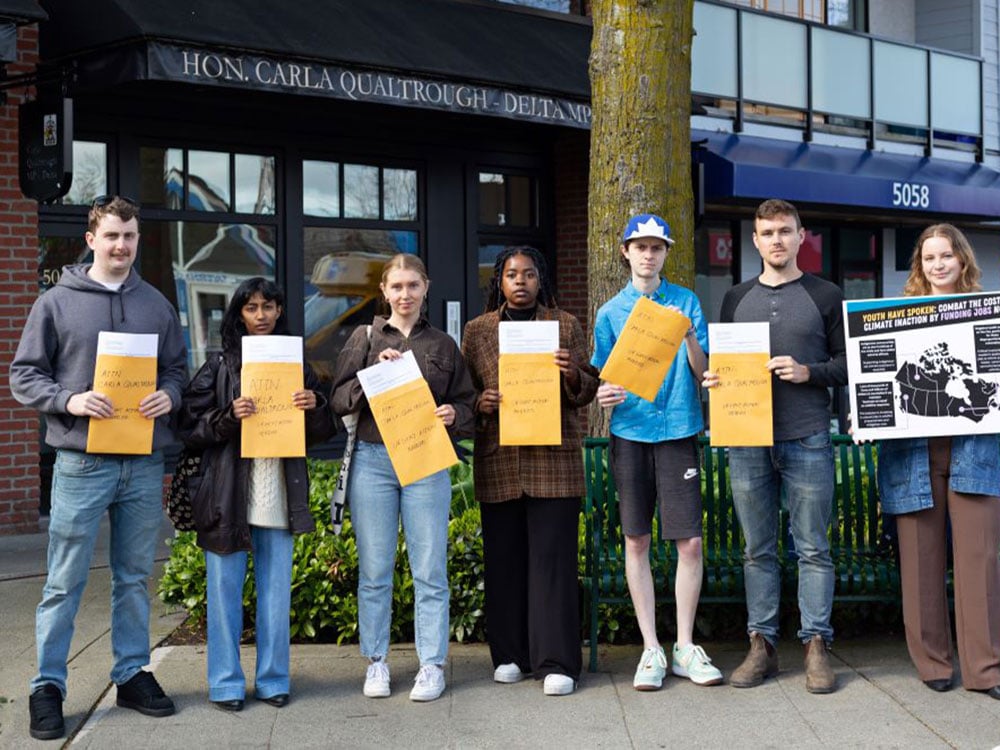Over 1,000 wildfires are burning across Canada. Families are fleeing their homes, haunted by the very real possibility that they may never be able to return.
This dystopian scene has become far too common. In June 2021, Lytton, B.C. experienced the highest temperature ever recorded in Canada: 49.6 C. A devastating wildfire then reduced the town to ashes. Two years later, the rebuilding process has hardly begun, yet residents of the Lytton First Nation are once again under evacuation alert due to wildfires.
This alert comes just after fires flattened the town of Enterprise in the Northwest Territories, as residents of Yellowknife have been evacuated, and while Kelowna and the Shuswap in B.C. battle their most severe wildfires in living memory. British Columbians are once again enveloped in that familiar haze, while an orange sun hangs low in the sky, eerie and apocalyptic.
Just as scientists and land protectors have been cautioning for decades, the climate emergency is here. If the previous heat dome, atmospheric rivers and wildfires were not convincing enough, the reality is undeniable now.
So what does yet another season of unprecedented wildfires mean for our elected officials? What does it mean for individuals?
To start, it is important to recognize that many of our elected leaders, at all levels of government, are stuck in incremental mode or a new form of climate denialism, wherein politicians claim to be climate leaders while approving planet-wrecking fossil fuel infrastructure in the same breath.
For many of us, such incongruous positions on climate (one of the few topics with a near-100-per cent scientific consensus) are difficult to comprehend. We understand the gravity of the civilizational threat we’re confronting. So why don’t our leaders?
Too many politicians are trapped within the confines of neoliberalism, where profit and extractivism reign supreme, where Indigenous, Black and Brown bodies are deemed disposable, and where it is considered too "politically risky" to genuinely act on climate, even when our lives depend on it.
But if not now, when? We’ve known about the climate crisis for over a century, after Eunice Foote discovered the greenhouse gas effect from her basement in 1856. Now, thanks to investigative books like Fire Weather by John Vaillant, and The Petroleum Papers by Geoff Dembicki, there is no room left for conjecture. In fact, some of Earth’s biggest fossil fuel giants themselves accurately predicted, nearly 40 years ago, that their product would lead to disastrous global heating.
Let us be clear. If our elected leaders will not act on climate, they are not the leaders we need and demand.
We call on politicians to be bold and take immediate action on climate mitigation and adaptation. We call on the government to fund a national Youth Climate Corps — a job training and placement program that would offer a good, green job to any young person who wants one. To meet the climate crisis head-on, we need creative solutions that will help us decarbonize, electrify and create job security with thriving wages. We also need new leaders to emerge who are ready to steer us away from disaster and toward a hopeful and just future.
This is a true test of climate leadership. Make no mistake: we are paying close attention to those who are courageous enough to act and speak the truth about the severity of the crisis, and those who are not. We will no longer accept politicians who approve oil and gas projects, including LNG, while the world burns.
Now is also the time for individuals to take action. Between Sept. 15-17, climate marches are taking place all around the world. Millions of people will be mobilizing to demand an immediate transition away from fossil fuels that is fast, fair and forever.
This is our chance to unite with our friends, families and neighbours and make our demands heard for transformative, emergency-level programs like a national Youth Climate Corps. ![]()
Read more: Rights + Justice, Environment
















Tyee Commenting Guidelines
Comments that violate guidelines risk being deleted, and violations may result in a temporary or permanent user ban. Maintain the spirit of good conversation to stay in the discussion and be patient with moderators. Comments are reviewed regularly but not in real time.
Do:
Do not: